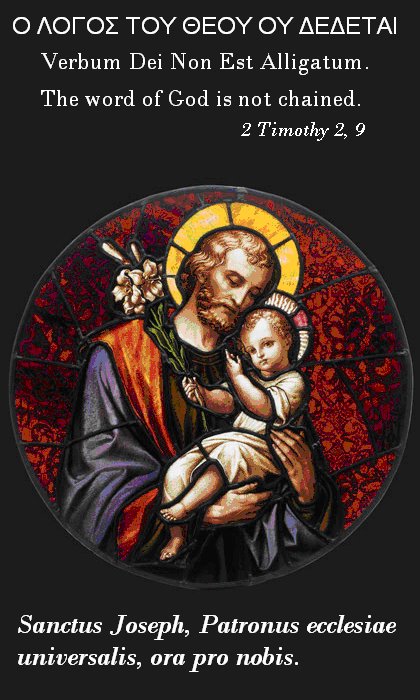I left out some of the text of Pope Benedict's talk on Theodore in my last post. Here is the rest:
"The principle renunciations for Theodore are those requested by obedience, since each of the monks has his own way of living and inclusion in the large community of 300 monks really involves a new form of life, which he qualifies as "the martyrdom of submission." Also here the monks give an example of how much is required of us also. Because of original sin, the tendency of man is to do his own will, to submit everything to his own will. But in this way, if each person follows only his own self, the fabric of society breaks down. Only by learning to insert oneself into the common freedom, to share and submit oneself to it, to learn the law, that is, the submission and obedience to the rules of the common good and the common life, can society, and indeed the "I" itself, be healed of the pride of wishing to be the center of the world. In this way St. Theodore helps his monks, and us as well, with acute introspection, to understand the true way to live, to resist the temptation of setting up one's own will as the highest rule of life, and to preserve one's true personal identity -- which is always an identity involving togetherness with others -- and one's peace of heart.
For Theodore the Studite a virtue on a par with obedience and humility is philergia, the love of work, in which he sees a criterion for testing the quality of one's personal devotion: whoever is zealous in material commitments, who works assiduously, he argues, will be the same in spiritual matters. He does not allow a monk, under the pretext of prayer and contemplation, to be dispensed from work, including manual labor, which is in reality, according to him and to the whole monastic tradition, the means of finding God. Theodore does not fear to speak of work as the "monk's sacrifice", as his "liturgy", even as a sort of Mass by means of which monastic life becomes angelic life. By this means the world of work is humanized and a person through his work becomes more himself, and closer to God. A consequence of this singular vision should be borne in mind: exactly because it is the fruit of a form of "liturgy", the riches obtained from common labor should not serve the comfort of the monks but should be destined for the aid of the poor. Here we can all accept the necessity that the fruit of work be of benefit for all. Obviously, the work of the Studites was not only manual: the monks would have a great importance in the religious and cultural development of Byzantine civilization as calligraphers, painters, poets, educators of youth, school teachers, librarians.
While carrying out a vast range of external activity, Theodore did not let himself be distracted from what he considered to be strictly required by his role as superior: being a spiritual father to his monks. Never forgetting the decisive influence his good mother and sainted uncle had on his own life, he exercised a comparable spiritual direction with his monks. His biographer tells us that every day after evening prayer he installed himself at the iconostasis to listen to the confidences of all. He also gave spiritual counsel to many people outside the monastery. His Spiritual Testimony and his Letters put in relief this open and affectionate character of his, and show how from his paternity were born true spiritual friendships within and outside his monastery.
The Studite rule, known under the name Hypotyposis, codified a little after his death, was adopted with some modifications on Mount Athos when in 962, Saint Athanasius the Athonite founded the Great Lavra there, and in Kiev, when at the beginning of the second millenium, St. Theodosius introduced it in the Lavra of the Caves. Understood in its genuine significance, the Rule shows itself to be particularly current. There are today numerous opinions which attempt to undermine the unity of the common faith and incite a dangerous sort of spiritual individualism and pride. It is necessary to pledge oneself to defend and make grow the perfect unity of the Body of Christ, in which the peace of good order and sincere personal relationships in the Spirit are comprised.
Subscribe to:
Post Comments (Atom)

No comments:
Post a Comment